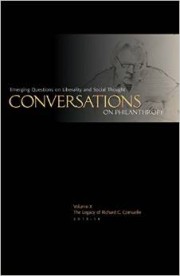Philanthropy and the Federal Income Tax: Should our Republic Subsidize Tocqueville’s Democracy?
The U.S. Internal Revenue Code’s charitable exemption and deduction clearly treat philanthropy favorably; the question for tax theory has always been why, and how well. The traditional subsidy theory has offered no means of comparing the relative goodness of one philanthropic purpose with another, or of comparing philanthropic providers of a good or service with alternative suppliers in the for-profit or governmental sectors. It simply has accepted that all philanthropy, whatever that is, is good, and deserving of favorable tax treatment.
This seems, on its face, to be a serious deficiency, if not an outright vice. On closer inspection, however, we can see it to be an odd virtue born of the need to fit our understanding of charity to our capitalist market economy on the one hand and our liberal democratic polity on the other. If our philanthropy is to be both consumerist and populist, it must be agnostic about both human need and human excellence; it must leave the specification of philanthropy’s dual traditional aims to the market and the electorate. That is the implicit genius of the traditional subsidy theory: it does not fail to specify the goodness of particular philanthropic purposes; it simply leaves that decision to the philanthropic participants themselves, bowing deeply to Tocquevillean democracy.
But we also need to see that that obeisance is a choice our republic need not make—indeed, should not make, if it is to honor both philanthropy’s better traditions and its own. We need not conform our philanthropy to the two-sided mold of our current economics and politics if we prefer other politics and other economics. Borrowing from deep traditions in our philanthropic sector, we can, instead, see this mold as an iron maiden, profoundly damaging to what we believe best in both our society and ourselves. The function of philanthropy, from this neo-classically republican perspective, is not to conform to this world but to transform this world into its own image. At the very least, that would give both market capitalism and liberal democracy a human face and a humane spirit; at the very best it would move our whole society past self-congratulating self-aggrandizement toward the public virtues of the American founders and the classical philosophers. Toward that goal, removing the federal tax code’s underwriting of Tocquevillean democracy would not be the worst place to start (nor, alas, the easiest).
The Function of Tax Exemption
From a functional perspective, tax exemption subsidizes individuals’ ideas about the public good. This new perspective on the traditional subsidy theory looks neither at the products charities provide nor at anything special about the way they provide them, beyond the fact that they are provided by philanthropic-sector organizations that are, by definition, forbidden to distribute net profits to any owning or controlling group. Instead, this perspective focuses on the way those goods and services are chosen by those who support their provision; that way of choosing is, in a word, individualistic. Citizens decide for themselves what charities to give to and, more basically, what charities to found. This very individualism is the focus of Alexis de Tocqueville’s oft-quoted observations about Americans’ inclination to form associations for what they take to be publicly beneficial functions:
In no country in the world has the principle of association been more successfully used or applied to a greater multitude of objects than in America. Besides the permanent associations which are established by law under the names of townships, cities, and counties, a vast number of others are formed and maintained by the agency of private individuals.
… If a stoppage occurs in a thoroughfare and the circulation of vehicles is hindered, the neighbors immediately form themselves into a deliberative body; and this extemporaneous assembly gives rise to an executive power which remedies the inconvenience before anybody has thought of recurring to a pre-existing authority superior to that of the persons immediately concerned. If some public pleasure is concerned, an association is formed to give more splendor and regularity to the entertainment. Societies are formed to resist evils that are exclusively of a moral nature, as to diminish the vice of intemperance. In the United States associations are established to promote the public safety, commerce, industry, morality, and religion. There is no end which the human will despairs of attaining through the combined power of individuals united into a society (1972, 1:191-192).
On this view, individual Americans, acting in voluntary collaboration, both define social problems and offer solutions to those problems. Americans define the good, that is, not by a nationally shared sense of “goodness” nor by the national recognition of social need, but rather by their joint action in voluntary associations. From this observation we can derive a Tocquevillean definition of charity: whatever nonprofit activity citizens say is in the public interest and put their time, money, or other resources into. As a matter of both liberal principle and constitutional law, the state cannot discourage this kind of associational activity unless the ends themselves can be made illegal.
But to say that the state cannot ban such associational activity is not to say that it should encourage it; to define Tocquevillean charity is not to prove that it is good. And so, too, the question of whether to relieve such public-spirited private initiatives from the burden of taxation, and further to relieve their donors to the extent of their donations is, necessarily, a normative question. Another critical feature of the Tocquevillean understanding of charity is this: the majority’s decision on that normative question is conclusive. Thus the functional definition of Tocquevillean charity—whatever nonprofit project anyone wants to undertake in what they take to be the public interest—is matched with is normative justification: a majority of citizens believe that this kind of social action, even by political minorities, is good in general, and also worthy of particular favor in the tax system. In a democracy, as democracy, there is no other measure of the good. A majority can decide to grant this favor, or not; ours has granted it, and therefore it is good. The people in a democracy are, in principle, like God in a theocracy: their will is the law, and their law is right and good.
Subject to constitutional constraints (which are themselves subject to democratic revision), a majority of citizens can choose to support not only particular goods or services they themselves favor, but also those that their neighbors, even their neighbors in a minority, favor. This is, in effect, what it means, in the context of the special tax treatment of charity, to say that it promotes the values, or meta-benefits, of “pluralism” and “diversity.” The traditional subsidy theory’s odd inability to provide a substantive definition of the public benefit that it holds to be the basis of the exemption and deduction can thus be seen not as a failure but as a virtue, a bow toward Tocquevillean philanthropy.




